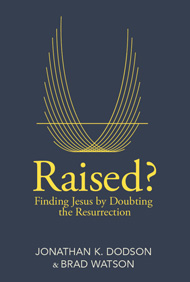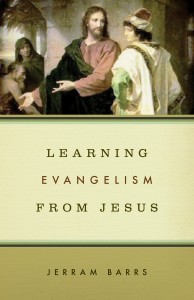I’m considering the idea of doing a book on missional community. This might be in a chapter. If you think we need any of this in print, let me know. I should note that Brad Watson & I just finished Called Together: A Guide to Forming Missional Communities. It’s more of a “how to,” whereas this book would be a “what, why, and a bit of the how.”
—
If you’ve been following the Missional Church movement, then you’ve bumped into the term missional community. If you haven’t, then you will appreciate this observation. The funny thing about “missional community†is that the name isn’t really “missional.†It doesn’t translate for un-churched people.
Consider walking next door to your new neighbor and saying: “Hey, neighbor, wanna come over and hang with my ‘missional community’?†How inviting! Depending on your context, the term “missional community†can sound awfully foreign, technical, or even cultic. Or if you’ve been around Christianity for a while, missional community may sound like a new name for small groups, a rebranding to go with all the “missional church†buzz. What is missional community? Are missional communities really any different than small groups? These are the questions we will answer in this chapter.
The Missional Church
The missional church is not a church with a mission. All churches have a mission. Stated or unstated, all churches practice some kind of mission. It may be keep to the immoral out, to keep sound doctrine in, to pray for revival, or to send missionaries to the nations. Each of these churches is an example of church with a mission. The missional church, however is church as mission. In the words of Darrell Guder, the challenge “is to move from a church with mission to a missional church.â€[1] What then is a missional church? Guder writes: “With the term missional we emphasize the essential vocation and nature of the church as God’s called and sent people.â€[2] Missional churches are missional in nature and vocation.
In other words, mission is the blood and breath of the missional church. Mission is not a tack-on to your life; it is your life. It flows through you, pulsing at various strengths but pulsing, in order to give breath to sharing and showing the gospel of Jesus Christ. It changes how you check the mail, how you structure your week, how you relate to neighbors, how you do your work, how you read the Bible, where you live, how you live, how you make your everyday decisions. Missional is radical, like taking up your cross and following Jesus. Missional church is a gathering of cross-bearing, Jesus-following disciples who are committed to his mission. Missional church requires nothing less than a rethinking of our identity and our practice, of who we are and what we do. Therefore, in order to effectively embrace the challenge of moving from church with a mission to church as mission, new ecclesiastical structures such as missional communities are absolutely essential.
Missional Community
A missional community is a church structure that gathers and sends groups of people on a common mission, i.e. to engage artists in the city or to help the homeless downtown. This church structure is derived from a particular view of the triune God—a divine community on mission. The Father sending the Son, the Son sending the Spirit, the Spirit sending the Church into the world to share and show the gospel of Jesus Christ. Missional communities, then, are an ecclesial expression of the missionary and communal nature of God. They are small communities of people participating in the mission of God. Technically, the term is spot on.
Missional communities have been referred to as: Clusters, Gospel communities, or even Trash Groups.[3] Missional community, however, has become the most common term in Missional Church literature. Hence, we will refer to them as missional communities or gospel communities.[4] We refer to them as City Groups. The primary reason we chose to call them City Groups is based on contextualization, a principle of missional community. Contextualization is the intentional process of communicating the historic gospel of Jesus Christ in appropriate cultural forms.[5] We will return to contextualization when we address mission.
What a Missional Community Isn’t
Perhaps it would be helpful to clarify what a Missional Community is not. The missional leaders of Soma Communities, Jeff Vanderstelt and Caesar Kalinowski, have helpfully distinguished missional communities from various other church structures by stating what they are not.[6] They are primarily not:
- A Small Group
- A Bible Study
- A Therapy Group
- A Socially-Minded Small Group
- A Weekly Meeting
- A Cell Group
While missional community retains aspects of these types of groups, it is not defined by one of these characteristics alone. Missional communities should study the Bible, often reflecting on a sermon or a passage of Scripture. They should provide gospel-centered counsel (not therapy) for one another. They are socially active, frequently engaging the social needs in their part of the city. They do meet for more formal gatherings, but their community is not restricted to a meeting. Like a cell group, City Groups are evangelistic; however, they practice evangelism within a much larger understanding of the mission and nature of the church. It is this understanding of mission and the nature of the church that sets missional communities apart from the list above.
Recall that a missional community is a church structure that gathers and sends groups of people on a common mission. In order to carry out this mission, each missional community needs to identify the specific mission God is calling them to. If mission is the problem, it is up to the community to embody and communicate the solution. The “problem†of mission is incredibly diverse—human trafficking, neglected elderly, dilapidated projects, homeless transients, drug addicts, work addicts, porn addicts, artists on the eastside, homeless women and children, broken social, political, and cultural systems, urban gentrification, rural bigotry, suburban idolatry, environmental crisis, and hell-bound sinners who, apart from the hearing the gospel of grace, will spend a Christless eternity. This is the problem of mission.
The Missional Cycle
An effective missional community raises the problem of mission; addresses it with the solution of the gospel, in the context of community. This is the Missional Cycle—gospel, community, and mission all working together to push the mission of the church forward in the hope of redemption. The Missional Cycle is cyclical because the problem of mission will not go away until Christ returns. It’s not something we do once, but something we do over and over again. We will explain the Missional Cycle more in chapter four. At this point, it is important to understand that missional community combines three essential elements—gospel, community, and mission—in order to address the problem of mission. Missional community, then, is more than a church structure but requires structure in order to effectively address the problem of mission.[7]
Refining our definition of missional community, we might say that missional community is a church structure that gathers and sends people on mission to share and show the gospel of Jesus Christ to one another and the world.
Gospel, community, and mission are the three essential elements for healthy missional communities. Mission is the problem. Community is the context. The Gospel is the solution. The goal of the missional community is to raise the problem of mission, address it with the solution of the gospel, in the context of community. In the next three chapters, we will unpack missional community by examining each of these three primary elements. We will begin with the solution—the Gospel of Jesus Christ.
—
[1] Darrell Guder ed., The Missional Church: A Vision for the Sending of the Church in North America, 6. This was a landmark book for the missional church movement in North America. Many missional leaders and organizations can trace their roots to Guder’s seminal influence on American ecclesiology.
[2] Guder, The Missional Church, 11.
[3] Mike Breen may have formally coined the term “missional community†while serving as pastor at St. Thomas Crookes parish in Sheffield, England. Breen developed a particular type of missional community also known as “clusters.†Clusters are technically mid-sized missional communities that range between 25-65 people, but bear the same essential qualities of a missional community. Hopkins and Breen, Clusters: Creative mid-sized Missional Communities, 10-28.
[4] Gospel Communities is the term we have decided to use for our resource organization the GCM (Gospel Communities on Mission) Collective: www.gcmcollective.com.
[5] A broader and more technical definition of contextualization: “the attempt to communicate the message of the person, works, Word, and will of God in a way that is faithful to God’s revelation, especially as put forth in the teaching of Holy Scripture, and that is meaningful to respondents in their respective cultural and existential contexts.” Hesselgrave and Rommen, Contextualization: Meanings, Methods, and Models, 200.
[6] Vanderstelt and Kalinowski, “Developing Missional Communities†I have adapted their list.
[7] Note the various missional communities throughout church history, especially the missional communities of the Early Church and the Irish.


